
Vandamme, M., Robert, E., Lerondel, S., Sarron, V., Ries, D., Dozias, S., Sobilo, J., Gosset, D., Kieda, C., Legrain, B., Pouvesle, J.M., and Le Pape, A.
ROS implication in a new antitumor strategy based on non-thermal plasma
International Journal of Cancer 130 (9) 2185-2194
Résumé :
Non-thermal plasma (NTP) is generated by ionizing neutral gas molecules/atoms leading to a highly reactive gas at ambient temperature containing excited molecules, reactive species and generating transient electric fields. Given its potential to interact with tissue or cells without a significant temperature increase, NTP appears as a promising approach for the treatment of various diseases including cancer. The aim of our study was to evaluate the interest of NTP both in vitro and in vivo. To this end, we evaluated the antitumor activity of NTP in vitro on two human cancer cell lines (glioblastoma U87MG and colorectal carcinoma HCT-116). Our data showed that NTP generated a large amount of reactive oxygen species (ROS), leading to the formation of DNA damages. This resulted in a multiphase cell cycle arrest and a subsequent apoptosis induction. In addition, in vivo experiments on U87MG bearing mice showed that NTP induced a reduction of bioluminescence and tumor volume as compared to nontreated mice. An induction of apoptosis was also observed together with an accumulation of cells in S phase of the cell cycle suggesting an arrest of tumor proliferation. In conclusion, we demonstrated here that the potential of NTP to generate ROS renders this strategy particularly promising in the context of tumor treatment.
